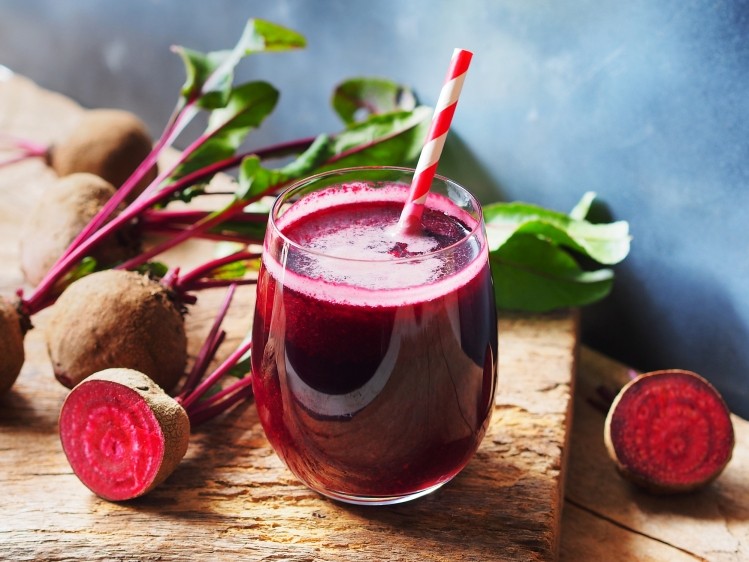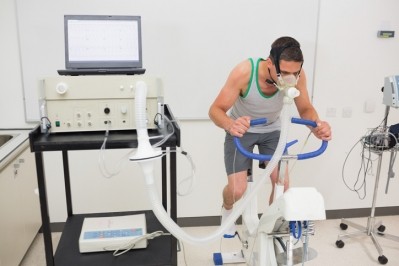Study: Beetroot supplements could boost weight training performance

Beetroot juice (BJ) has been associated with improvements in physical performance in endurance sports with much scientific focus on its effects on heart health. One much publicised study by scientists at the University of Exeter in the UK reported that beetroot juice may boost stamina and allow people to exercise for up to 16% longer.
The principal active element of BJ is its dietary inorganic nitrate (NO3- ) which has been shown to be beneficial in the regulation of blood flow, blood pressure, cellular signaling, glucose homeostasis, and a reduction in the risk of cardiovascular disease. It is believed the nitrate content may reduce oxygen uptake to an extent that cannot be achieved by any other known means, making exercise less tiring. However, the literature on resistance training (RT) is scarce.
In the current study, published in 'Nutrients', researchers from the University of Cordoba, Spain, aimed to investigate the acute effects of a BJ supplement 120 minutes before training, compared to a placebo (PLA), on muscular endurance and movement concentric velocity during RT.
They found the BJ supplement appeared to produce an ergogenic effect on the muscular endurance performance in RT, particularly, increasing total repetitions performed, accompanied by the same RPE and without changes in blood lactate levels in participants.
However, BJ supplementation did not improve performance in terms of movement concentric velocity and power in back squat and bench press. These findings suggest that BJ supplementation could improve muscular endurance, increasing tolerance to RT.
Method
Twelve healthy men performed an incremental RT test (back squat and bench press) with three sets, at 60%, 70%, and 80% of their repetition maximum.
Movement velocity variables, number of repetitions before failure, blood lactate, and ratings of perceived effort (RPE) were measured.
The researchers found that a higher number of repetitions were recorded by those supplemented with BJ compared to those with PLA (13.8 ± 14.4; p < 0.01; effect size (ES) = 0.6).
Differences were found at 60% (9 ± 10; p < 0.05; ES = 0.61) and 70% (3.1 ± 4.8; p < 0.05; ES = 0.49), however, no differences were found at 80% 1-RM (1.7 ± 1; p = 0.12; ES = 0.41).
A greater number of repetitions was performed in back squat by those supplemented with BJ (13.4 ± 13; p < 0.01; ES = 0.77), but no differences were observed in bench press (0.4 ± 5.1; p = 0.785; ES = 0.03).
The team concluded that acute supplementation of BJ improved muscular endurance performance in RT.
Mechanisms of action
The report states that improvements in muscular endurance could be based on the role of NO as a blood pressure regulator thanks to its vasodilatory effect (widening of blood vessels), along with its ability to inhibit blood coagulation.
A greater volume of blood, and hence oxygen, is an important muscular endurance component. A greater oxygen supply delays the onset of muscle fatigue in sports performance and leads to increased energy production from ATP via aerobic metabolic pathways, delaying the onset of anaerobic metabolic pathways, since more intense and longer-lasting physical activity leads to higher oxygen consumption (VO2) in order to generate the required ATP.
The report explains: "As a result, the use of NO3- could increase sports performance, since its vasodilatory function and the greater supply of oxygen to the muscles increases the subjects’ maximum VO2 (VO2max) and reduces the oxygen consumption for the exercise.
"All this would lead to a decrease in the ATP cost and thus mitigate the changes in intramuscular substrates and metabolic production, increasing muscle oxygenation, delaying the onset of muscle fatigue. Consequently, reduced oxygen consumption and a lower ATP cost would delay lactate production. In this way, since lactate is an indicator of the contribution of glycolysis to metabolism, having obtained an increase in the number of total repetitions after the consumption of BJ with the same concentrations of blood lactate could suggest an energy efficiency.
"Accordingly, Bailey et al. demonstrated that BJ consumption reduces both the O2 costs and the degree of PCr degradation during both low- and high-intensity exercise without affecting muscle pH, improving exercise efficiency, and this could explain the greater load carried by the subjects when they consumed BJ."
The report adds that BJ supplementation has been shown to increase limb blood flow and skeletal muscle in preference to fast-twitch fibers (type II) and improved blood flow to type II fibers may have resulted in improved and sustained muscle strength.
The authors note that a possible mechanism of BJ on RPE is the improvement in blood flow to the frontal lobe of the brain which regulates decision making and motor control, contributing to subjective perception of effort, being able to cause a possible increase in exercise performance.
The report notes: "In addition to this, it should be noted that maintaining RPE after BJ supplementation could be the result of reduced central motor command as a result of preserved contractile function during exercise, since it has been claimed that RPE reflects a mechanism of centrally mediated feedback in which a copy of the central motor command output is sent from the motor areas to the sensory brain to allow conscious awareness of the processes associated with motor output.
"During fatigued contractions, the progressive increase in RPE could reflect the increase in central motor command, necessary to compensate for exercise-induced deficiencies in contractile muscle function to ensure adequate power output to maintain the task."
Limitations
The report lists a number of limitations of this study.
"Although, it is known that a dosage of BJ similar to that in this study significantly increases plasma NO2-, plasma NO2- was not measured before the intake, leaving the concentration needed to accompany resistance exercise improvements unknown.
"Furthermore, the incremental test protocol (60%, 70%, 80% 1-RM) used could generate a possible accumulated fatigue in the subsequent series. The study only investigated a range of relative intensity of moderate loads, therefore, the ergogenic effect on neuromuscular performance of BJ could be investigated in a wider range of relative loads, used with different orientation, as has been studied in supplements rich in NO3- or other supplements."
Source: Nutrients
Ranchal-Sanchez, A.; Diaz-Bernier, V.M.; De La Florida-Villagran, C.A.; Llorente-Cantarero, F.J.; Campos-Perez, J.; Jurado-Castro, J.M.
"Acute Effects of Beetroot Juice Supplements on Resistance Training: A Randomized Double-Blind Crossover"
https://doi.org/10.3390/nu12071912












